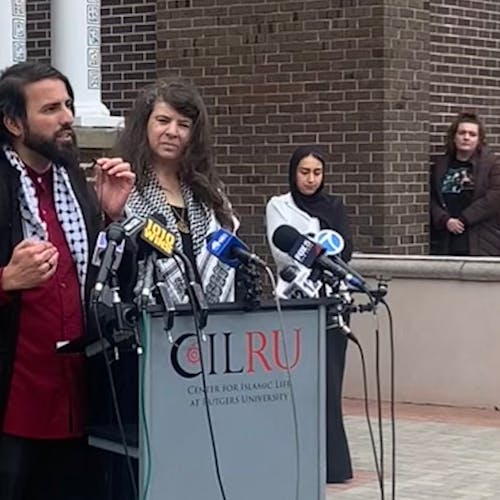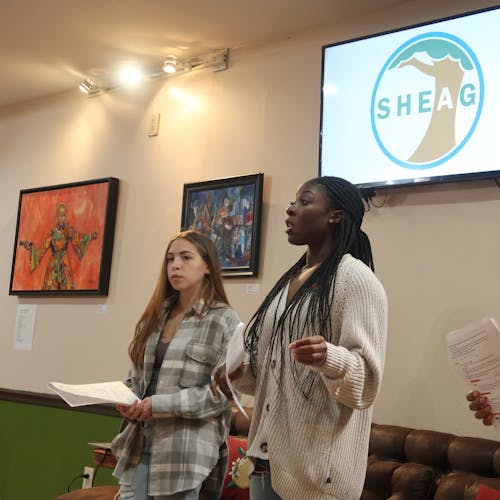Eagleton Institute hosts Science and Politics workshop on gene editing

Jonathan Moreno, a University of Pennsylvania professor, discussed the topic of gene editing and bioethics as part of the Science and Politics Workshop on Feb. 21. The event was hosted by the Eagleton Institute of Politics.
As the lead speaker, Moreno engaged the audience on the topic of gene editing. Two other professors, T. Patrick Hill, associate professor at Edward J. Bloustein School of Planning and Public Policy, and Wise Young, distinguished professor in the Department of Neuroscience, were also asked to share their expertise. The event was open to Rutgers graduate students, post-doctoral fellows and faculty and staff.
Clustered regularly interspaced short palindromic repeats (CRISPR) is a gene-editing tool that allows scientists to modify or delete precise portions of our DNA so that we can treat the worst of infectious diseases. Gene editing can now be used to treat the sickle-cell condition in humans and to develop immuno-oncology cell therapy, according to the official website on CRISPR.
“When there are no treatments at all for serious diseases, then you can argue that we do matter, we invoke medical benefits,” Moreno said.
The ongoing debate in the field of gene-editing is that there might be other ways to reduce the risk of diseases, such as HIV, that would not involve biomedical enhancement, Hill and the other speakers said.
“What the accumulating evidence suggests is that we can edit with CRISPR, but just because we can does not mean we ought to do it,” Hill said.
Hill and the other speakers said the advent of CRISPR and other gene-editing tools has raised questions of morality and ethics, such as who should be responsible for deciding when gene editing is allowed or at what point gene editing goes too far.
There are arguments on both sides for and against gene-editing to be made, Moreno said. For example, members of the deaf community have expressed disapproval of gene-editing. He said they find solace in their own language and culture, and they may not want deafness to be written out of their genetic code.
Moreno said the sperm and egg market, whereby parents are essentially picking and choosing their children by predetermining the genes they buy, is already a form of eugenics.
“Not that the very concept of modifying the human germline is a bad thing, but it could lead to the use of some kind of Nazi-like eugenics,” said Moreno.
Moreno said there is a universal fear that CRISPR could lead to the engineering of perfect babies that tailor to socially acceptable standards.
Media portrayal has contributed to the skewed representation of CRISPR and gene-editing, eliciting negative connotations on the topic, said Samantha Avina, a School of Graduate Studies second-year Ph.D. student.
“I just feel like the way it’s portrayed in the media is like ‘Gattaca,’” Avina said.
She said “Gattaca” is a movie about a future society that has a hierarchical social structure formed on the basis of eugenics.
Avina said she was covering the event for both the Rutgers iJOBS blog, which focuses on educating students on potential interdisciplinary job opportunities for biomedical students, as well as for herself. She said she was trying to gain a better understanding on the impact of gene-editing on the world.
During the question and answer portion of the event, the audience asked about how science and reproductive technologies could be taught better to non-scientists. The professors brought up examples of anti-vaccination groups, and the lowering levels of scientific education in American schools that have contributed to the worry that American students are not receiving a thorough education.
After the speakers had presented and answered the questions of the audience members, the workshop continued with an interactive exercise. Audience members were asked to split up and decide on the ethics of gene drive editing in a malaria case study.
Malaria is a well-known illness that caused hundreds of thousands of deaths in children less than five years old, according to Vox. In the study discussed by the audience, mosquitos had their DNA edited so that they can no longer carry the genetic marker of malaria.
There was not much debate among the workshop attendees that this disease needed to be cured. Participants also expressed that regardless, this did not excuse the moral implications that came with getting rid of malaria-carrying mosquitos.
Even though the event focused on the political implications of gene editing, many attendees, such as Avina and Nydia Chang, a School of Graduate Studies student who studies under Young in the Department of Neuroscience, come from scientific backgrounds.
“When I think about democracy and when I think about science, I did not think about them together much,” Chang said.



